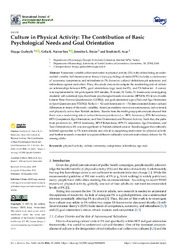Culture in physical activity: The contribution of basic psychological needs and goal orientation
| dc.contributor.author | Gürleyik, Duygu Karataş | |
| dc.contributor.author | Şen, Celia Katrine Naivar | |
| dc.contributor.author | Etnier, J. L. | |
| dc.contributor.author | Acar, İbrahim Hakkı | |
| dc.date.accessioned | 2023-06-02T09:00:55Z | |
| dc.date.available | 2023-06-02T09:00:55Z | |
| dc.date.issued | 2022-12 | |
| dc.identifier.issn | 1661-7827 | en_US |
| dc.identifier.uri | http://hdl.handle.net/10679/8355 | |
| dc.identifier.uri | https://www.mdpi.com/1660-4601/19/24/16691 | |
| dc.description.abstract | Numerous variables affect motivation in physical activity (PA) with culture being an understudied variable. Self-determination theory’s basic psychological needs (BPN) includes a combination of autonomy, competence, and relatedness in PA; however, cultural definitions pit autonomy and relatedness against each other. Thus, this study aims to investigate the moderating role of culture on relationships between BPN, goal orientations (ego, task) for PA, and PA behavior. A survey was implemented to 168 participants (109 females, 59 males; 92 Turks, 76 Americans) investigating students’ self-construal type, their basic psychological needs in exercise (BPNES), PA levels (Godin Leisure-Time Exercise Questionnaire/GLTEQ), and goal orientation types (Task and Ego Orientation in Sport Questionnaire/TEOSQ). Turks (n = 92) and Americans (n = 76) demonstrated distinct cultural differences in terms of the study variables. American students were more autonomous, task-oriented, and physically active than Turkish students. Results from the multi-group path analysis showed that there was a moderating role of culture between predictors (i.e., BPN Autonomy, BPN Relatedness, BPN Competence, Ego Orientation, and Task Orientation) and Physical Activity. Such that, the paths from predictors (i.e., BPNT Autonomy, BPNT Relatedness, BPNT Competence, Ego Orientation, and Task Orientation) to PA was not significant in Turkish cultural context. Results suggest that culturally tailored approaches to PA interventions are critical in supporting motivation for physical activity and further research is needed to explore different culturally relevant motivational drivers for PA among adults. | en_US |
| dc.language.iso | eng | en_US |
| dc.publisher | MDPI | en_US |
| dc.relation.ispartof | International Journal of Environmental Research and Public Health | |
| dc.rights | openAccess | |
| dc.rights.uri | https://creativecommons.org/licenses/by/4.0/ | |
| dc.title | Culture in physical activity: The contribution of basic psychological needs and goal orientation | en_US |
| dc.type | Article | en_US |
| dc.description.version | Publisher version | en_US |
| dc.peerreviewed | yes | en_US |
| dc.publicationstatus | Published | en_US |
| dc.contributor.department | Özyeğin University | |
| dc.contributor.authorID | (ORCID 0000-0003-1405-8513 & YÖK ID 280299) Gürleyik, Duygu | |
| dc.contributor.authorID | (ORCID 0000-0002-7791-1422 & YÖK ID 240115) Şen, Celia | |
| dc.contributor.authorID | (ORCID 0000-0003-4007-5691 & YÖK ID 267848) Acar, İbrahim | |
| dc.contributor.ozuauthor | Gürleyik, Duygu Karataş | |
| dc.contributor.ozuauthor | Şen, Celia Katrine Naivar | |
| dc.contributor.ozuauthor | Acar, İbrahim Hakkı | |
| dc.identifier.volume | 19 | en_US |
| dc.identifier.issue | 24 | en_US |
| dc.identifier.wos | WOS:000901170500001 | |
| dc.identifier.doi | 10.3390/ijerph192416691 | en_US |
| dc.subject.keywords | Autonomy | en_US |
| dc.subject.keywords | Competence | en_US |
| dc.subject.keywords | Culture | en_US |
| dc.subject.keywords | Ego | en_US |
| dc.subject.keywords | Physical activity | en_US |
| dc.subject.keywords | Relatedness | en_US |
| dc.subject.keywords | Task | en_US |
| dc.identifier.scopus | SCOPUS:2-s2.0-85144569027 | |
| dc.relation.publicationcategory | Article - International Refereed Journal - Institutional Academic Staff |
Files in this item
This item appears in the following Collection(s)
Share this page




